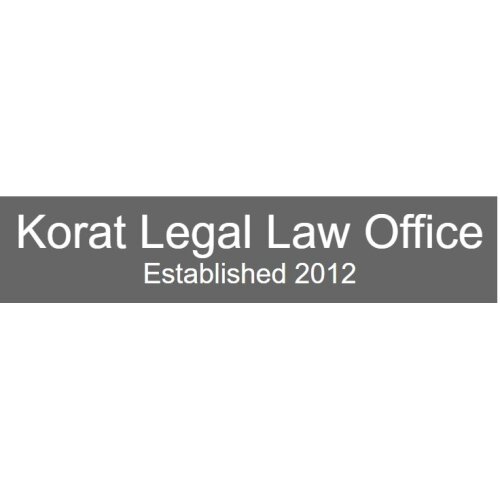Best Conveyancing Lawyers in Nakhon Ratchasima
Share your needs with us, get contacted by law firms.
Free. Takes 2 min.
Free Guide to Hiring a Real Estate Lawyer
List of the best lawyers in Nakhon Ratchasima, Thailand
About Conveyancing Law in Nakhon Ratchasima, Thailand
Conveyancing is the process of legally transferring property ownership from one person to another. In Nakhon Ratchasima, Thailand, conveyancing typically involves the sale, purchase, or transfer of land and buildings. The procedure is governed by Thai law and requires proper documentation, official registration with the Land Office, and compliance with local regulations. Whether you are a local resident, expatriate, or investor, understanding the intricacies of conveyancing is essential for a smooth and legally sound property transaction in this province.
Why You May Need a Lawyer
Engaging a lawyer for conveyancing in Nakhon Ratchasima can help you avoid legal pitfalls and ensure that the transaction runs smoothly. Common situations where legal assistance is advisable include:
- Purchasing or selling property, such as land or houses, where complex contracts and significant sums of money are involved
- Transferring property as part of divorce, inheritance, or family arrangement
- Ensuring compliance with foreign ownership laws, especially for non-Thai nationals
- Resolving disputes over property boundaries or ownership rights
- Dealing with leasehold or usufruct arrangements
- Securing title searches and due diligence to confirm legal ownership and absence of encumbrances
- Navigating tax and fee requirements associated with property transfer
A knowledgeable lawyer will safeguard your interests, explain your rights and obligations, and help you avoid costly errors.
Local Laws Overview
Conveyancing in Nakhon Ratchasima is governed by the Civil and Commercial Code of Thailand, the Land Code Act, and regulations issued by the Land Department. Key aspects include:
- All property transfers must be registered at the local Land Office. Verbal or informal agreements have no legal effect in property transfers.
- Non-Thai nationals are generally prohibited from owning land, but there are exceptions such as through leasehold, company structures, or certain investment incentives.
- A title search is essential to confirm the land’s legal status and identify any restrictions or claims against the property.
- Transfer fees, income taxes, and stamp duties are payable upon registration. The party responsible for these costs can be negotiated in the sale and purchase agreement.
- Both parties must provide the required documents, including identification, land title deeds, and relevant forms.
- If purchasing off-plan or from a developer, additional consumer protections may apply.
Being aware of local practices and government procedures can prevent issues during the conveyancing process.
Frequently Asked Questions
What documents are required for property transfer in Nakhon Ratchasima?
Typically, you need valid identification, the original land title deed, a sale and purchase agreement, and official transfer forms. Both parties must attend the Land Office or appoint a legal representative.
Can foreigners own land in Nakhon Ratchasima?
Generally, foreigners cannot own land directly. However, they can own buildings, long-term leasehold rights, or invest through Board of Investment schemes. Legal advice is recommended to explore options.
How long does the conveyancing process take?
The process varies depending on case complexity and document completeness. Once all paperwork is in order, registration at the Land Office can often be completed in one day.
What fees and taxes are involved in a property transfer?
Common costs include transfer fee (usually 2 percent of the official appraised value), income tax or withholding tax, stamp duty, and sometimes specific business tax. These can be split between buyer and seller as negotiated.
Do I need to physically attend the Land Office on the day of transfer?
Both parties are generally required to be present. If not possible, you may appoint a lawyer or another trusted person with a power of attorney to handle the transaction on your behalf.
What is a usufruct, and can it be used to hold property rights?
A usufruct is a legal right allowing someone to use and benefit from land owned by another person, typically for up to 30 years. It can offer security for foreigners or family members.
What should I check before buying a property?
Verify legal title, check for encumbrances, confirm land boundaries, ensure the property complies with zoning and building regulations, and review relevant contract terms. A lawyer can perform a comprehensive due diligence check.
Is a verbal agreement to sell property legally binding?
No, under Thai law, all property transfers must be in writing and registered at the Land Office. Verbal agreements are not enforceable for property ownership changes.
Are there restrictions on transferring property to family members?
Property can generally be transferred to family members, but taxes and fees still apply. Special procedures may be needed if inheritance is involved.
How can I resolve a property dispute in Nakhon Ratchasima?
It is advisable to seek legal counsel. Disputes may be resolved via negotiation, mediation, or formal litigation. A lawyer can recommend the best course based on your circumstances.
Additional Resources
For further information or to seek assistance with conveyancing in Nakhon Ratchasima, consider the following resources:
- Local Land Office: The Nakhon Ratchasima Provincial Land Office manages property transfers, registrations, and title deeds.
- Department of Lands: The national regulator providing guidelines, publications, and updates related to property law in Thailand.
- Thai Lawyers Council: Offers directories of licensed lawyers experienced in property and real estate matters.
- Thai Real Estate Associations: Professional groups that can refer you to reputable companies and conveyancing specialists.
Next Steps
If you are planning to buy, sell, or transfer property in Nakhon Ratchasima, here are practical steps to follow:
- Gather all relevant documents, such as title deeds, identification, and previous contracts.
- Consult with a qualified local lawyer to review your case, explain your options, and identify any legal risks.
- Arrange a due diligence investigation to check property ownership, encumbrances, and regulatory status.
- Negotiate contract terms with the other party, with legal assistance as needed.
- Schedule an appointment at the Land Office for official registration, ensuring all fees and taxes are prepared.
- If complications arise or you have uncertainties, seek further legal advice before proceeding with the transaction.
Taking these steps, and working closely with legal professionals, will help you complete your property transaction confidently and securely in Nakhon Ratchasima, Thailand.
Lawzana helps you find the best lawyers and law firms in Nakhon Ratchasima through a curated and pre-screened list of qualified legal professionals. Our platform offers rankings and detailed profiles of attorneys and law firms, allowing you to compare based on practice areas, including Conveyancing, experience, and client feedback.
Each profile includes a description of the firm's areas of practice, client reviews, team members and partners, year of establishment, spoken languages, office locations, contact information, social media presence, and any published articles or resources. Most firms on our platform speak English and are experienced in both local and international legal matters.
Get a quote from top-rated law firms in Nakhon Ratchasima, Thailand — quickly, securely, and without unnecessary hassle.
Disclaimer:
The information provided on this page is for general informational purposes only and does not constitute legal advice. While we strive to ensure the accuracy and relevance of the content, legal information may change over time, and interpretations of the law can vary. You should always consult with a qualified legal professional for advice specific to your situation.
We disclaim all liability for actions taken or not taken based on the content of this page. If you believe any information is incorrect or outdated, please contact us, and we will review and update it where appropriate.









